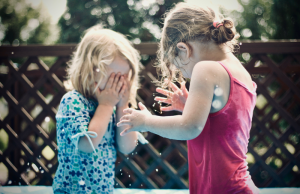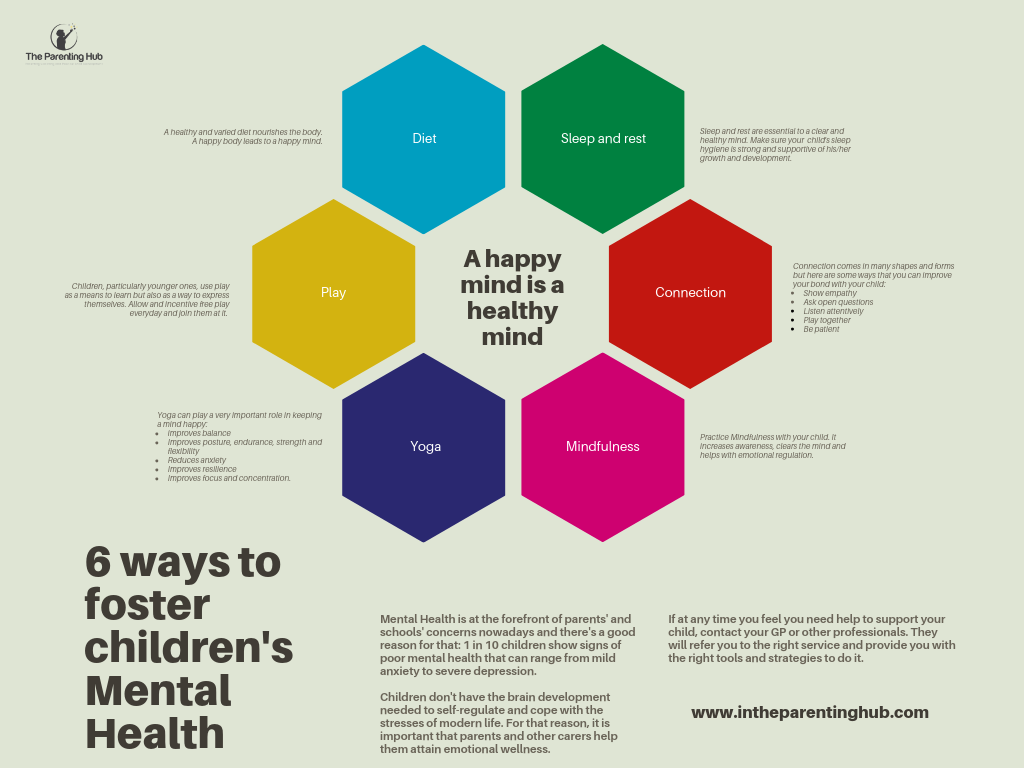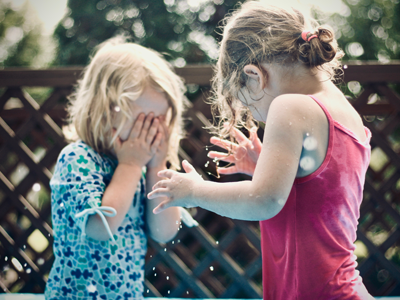Children’s mental health is a hot topic nowadays. We see cases on the news, we read posts on social media and we have all heard of children who are struggling, one way or another, with their mental health. As daunting as it is, the statistics confirm that the rise in mental health issues is real. Last year the NHS published a study that revealed that 1 in 10 children are affected by mental problems which begs the question: why are our children feeling less able to deal with daily challenges? Are we pushing them too hard? How can we better support them? Is there a way to prevent this scenario?

Every time I see these statistics I ask myself whether the numbers are actually increasing or if today, unlike in the past, we are paying more attention to mental health issues and as a result we get more children (and grown-ups) diagnosed. It’s probably a combination of both. Children’s lifestyle has changed in the last few decades with a decline in play and the rise of social media (which can put a lot of stress on children that feel like they have to attain certain standards to be liked) and this change has probably taken its toll on their wellbeing.
But not everything is bad. While these factors can make it harder for children to cope with challenges, parents are much more aware of these issues and recognise that their role, actions and support is part of the solution. Mental health problems can of course range from mild anxiety to severe depression and I would always urge everyone to seek help for their child (or themselves) to get a diagnosis and adequate medical treatment when and if needed. Regardless, there are ways and steps that we can take to preserve mental health and support our children through these challenges.
6 ways to support your children’s mental health
Diet – A varied nutritious diet is essential to keep our bodies healthy and our minds happy. Eating fruit, vegetables and unsaturated fats has been associated with feelings of wellbeing according to several studies. Avoiding fat saturated foods, processed foods and keeping sugary foods for special occasions is a good start. You can find more information on what to eat and what to avoid for a better happy mind on the Mind charity website.
Sleep and rest – Sleep is absolutely fundamental for a clear and balanced mind. The link between sleep and mental health is now very well known and has been thoroughly studied. Creating a good sleep hygiene for children is essential to keep at bay mental confusion, low energy levels, mood swings and to strengthen the immune system. A sleep and rest routine that supports your child will not only keep them happy as it will prevent future mental health issues that result from sleep deprivation. Having a predictable, calm and relaxed bedtime routine in place is a good way to start. Keeping lights dim, reading a book or doing some breathing exercises just before bed will increase the quality of sleep.
Connection – Having loving connections with parents, siblings and other significant people is fundamental for children (and grown-ups too). During a time where their brains are still developing and maturing rapidly, having nurturing and supportive relationships will have a lasting impact (remember, neurons that fire together, wire together). When we feel loved and connected, a particular set of chemicals are released into our brains (such as serotonin, dopamine and oxytocin) that make us feel good, improve our immune system, our stress management skills, reduces anxiety (by decreasing the levels of cortisol in our blood stream), gives a sense of purpose and belonging and, overall, protect us from mental illness. Fostering a close bond with our children can be achieved by showing them empathy, communicating clearly with them by asking them open questions and being interested in them and their lives, showing affection and being patient. And lots of play. Even when they grow out of traditional play, joining them in their hobbies will definitely strengthen the connection between you. To love them is to enjoy them.

Mindfulness – Mindfulness is being more widely adopted in different settings, at work, in schools and as a therapeutic technique to aid and prevent mental illness. And there’s a good reason for its popularity. Mindfulness, according to the dictionary, is “the quality or state of being conscious or aware of something.” By paying attention to the present moment, we become more aware of our bodily sensations, emotions, feelings and thoughts and learn how to manage them better and improve our resilience levels. The National Institute for Health and Care Excellence (NICE) now recommends Mindfulness as a way to prevent depression. There are a number of places where you can learn how to practice Mindfulness and many schools are embracing it. If you don’t know where to start, there’s also plenty of literature on Mindfulness and Meditation for children around the web. A great place to start is the Oxford Mindful Centre.
Yoga – Yoga is an ancient eastern practice that has been growing in popularity in the last few decades. And even though there’s a physical part to it (and plenty of physical benefits to it), there is much more to its practice. In fact, Yoga also includes Mindfulness and there’s a focus on the present moment while also improving body awareness, balance, posture, endurance, strength and flexibility. In a typical Yoga class, breathing techniques are applied and these in turn, promote calm, relaxation and reduce anxiety. A Meditation practice is also part of Yoga, which again, is known for promoting mental health. Through a regular yoga practice, children and adults alike can experience an increase in their resilience and focus levels, while kindness and a sense of belonging is promoted. Many schools are now offering Yoga classes for children, as are local studios. You can find fun yoga videos for children on Youtube and practice along with your children or get a teacher to come to your home. If you’d like more information you can go to the Yoga Journal or check Cosmic Kids page.
Play – According to several studies, the decline in free play is directly correlated with a decline in children’s mental health. Our modern lives offer us lots of activities and distractions but the pace of an overly structured life means that children lack the time to play freely, pursuing their own interests without the boundaries of schedules or schooling constraints. Children learn mainly through play, practising roles and exploring their own interests and the world around them. Playing freely allows them to have control over the activity they are involved in and it’s this sense of control (lacking in many other areas of their lives as the parents make most decisions for them) that will, in turn, allow them to develop skills that will benefit their mental health and prevent illness. Resilience and self-esteem are some of these skills. This is particularly true when children play outdoors. As humans, we thrive when we are part of our natural environment and, again, modern life has set us apart from being in contact with nature on a regular basis. Playing outside increases the production of Vitamin D, which in turn, releases serotonin, a hormone linked with a happy mood and wellbeing. It also decreases mental fatigue and improves gross motor skills. Allowing children to have time for unstructured play, particularly in the outdoors, it’s one of the greatest gifts we can give them.

These are some ways in which you can support your children’s mental health. But most of all, pay attention to any changes in their behaviour or other signs that your child may be struggling (drop in grades/ attention at school, mood swings, etc.) and don’t be afraid to ask for help. Seek advice from your GP, Health Visiting team or other professionals that you may find suitable. There are also a number of charities working with children’s mental health. And if you feel that you may also benefit from help, go ahead and do it. If you’re struggling, focus on the essential and remove from your daily lives whatever is not serving you well. Remember, happy parents raise happy children. And along the way, enjoy the time you spend together.



